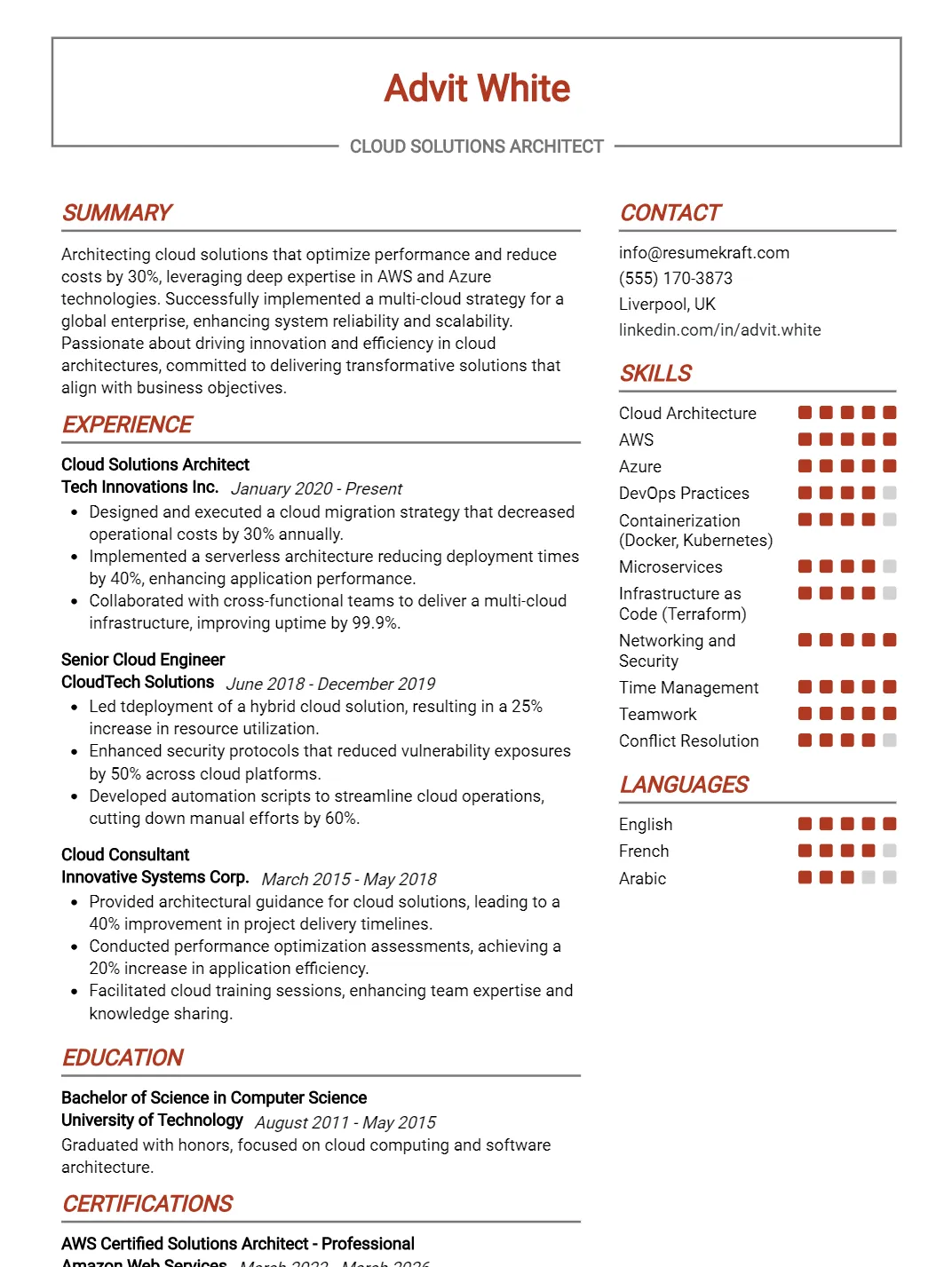
A Cloud Computing Engineer plays a pivotal role in designing, implementing, and managing cloud-based solutions that drive business efficiency and innovation. As organizations increasingly migrate to cloud infrastructures, the demand for skilled professionals in this field is skyrocketing. These engineers ensure seamless integration of cloud services, enhance data security, and optimize performance, making their expertise crucial in today’s digitally-driven landscape. This article aims to provide valuable insights into crafting a compelling resume that showcases the unique skills and experiences essential for aspiring Cloud Computing Engineers to stand out in a competitive job market.
- Cloud Computing Engineer resume examples
- How to format a Cloud Computing Engineer resume template
- How to write your Cloud Computing Engineer resume experience
- How to list your hard skills and soft skills on your resume
- How to list your certifications and education on your resume
- How to write your Cloud Computing Engineer resume summary or objective
- Additional sections for a Cloud Computing Engineer resume
- Key takeaways for writing a professional Cloud Computing Engineer resume
- Frequently Asked Questions
Cloud Computing Engineer resume examples
Cloud Computing Engineer resume examples serve as essential tools for job seekers looking to craft impactful resumes tailored to this in-demand field. These examples highlight key skills, accomplishments, and industry-specific terminology that can enhance a candidate’s appeal to potential employers. By analyzing effective resume formats and content, job seekers can better understand how to present their qualifications and stand out in a competitive job market.
Cloud Computing Engineer Resume
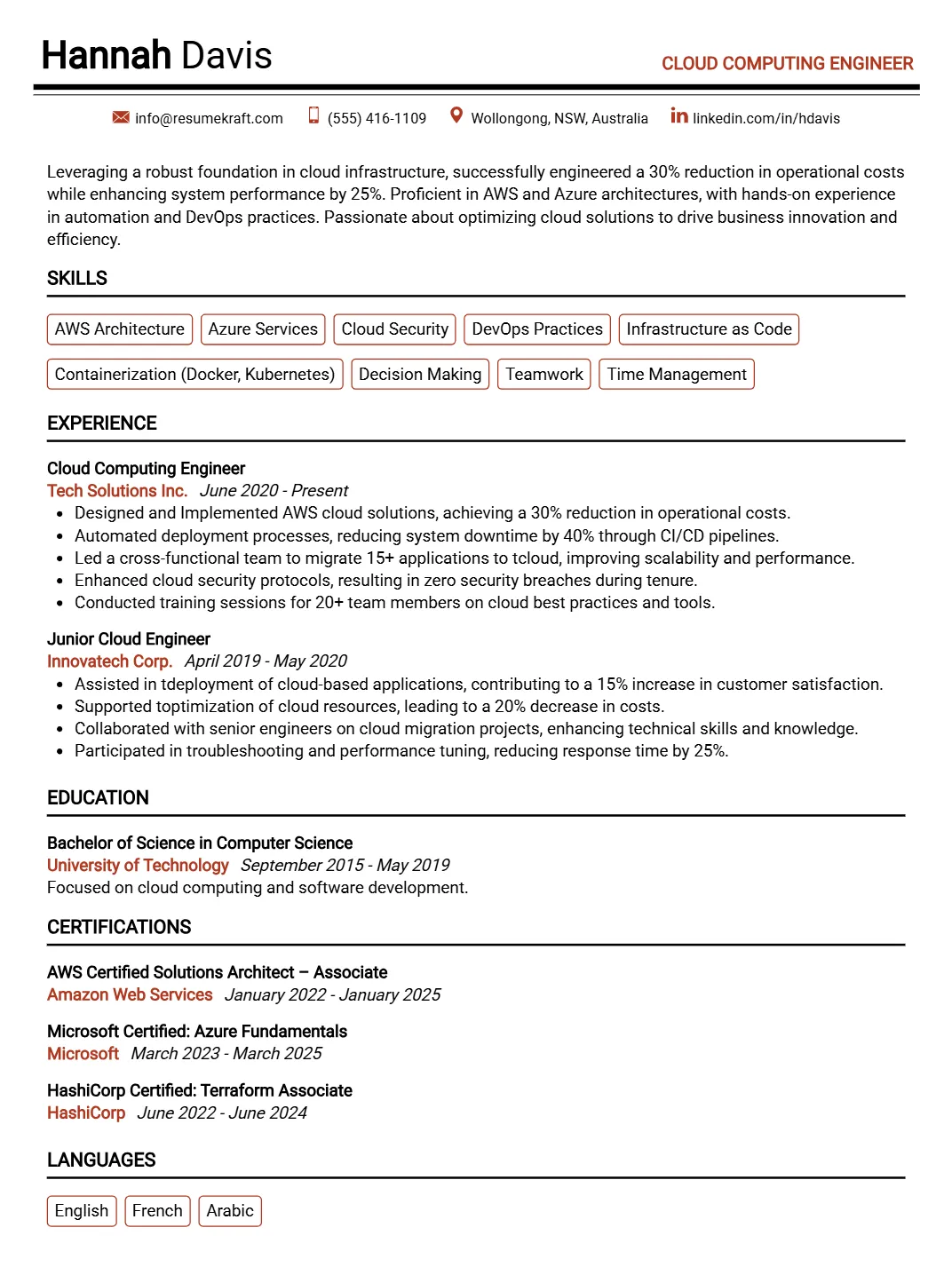
Why This Resume Works
This resume effectively positions the candidate for a Cloud Computing Engineer role by highlighting essential skills such as AWS Architecture and Cloud Security, which are crucial for cloud infrastructure design. The structured format emphasizes relevant experience, showcasing a solid 6-year background in cloud engineering roles. Its ATS-friendly layout uses industry-specific keywords to enhance discoverability. Additionally, the strategic presentation of achievements demonstrates proficiency in DevOps practices and Infrastructure as Code, aligning well with employer expectations in cloud computing environments.
Cloud Engineer Resume
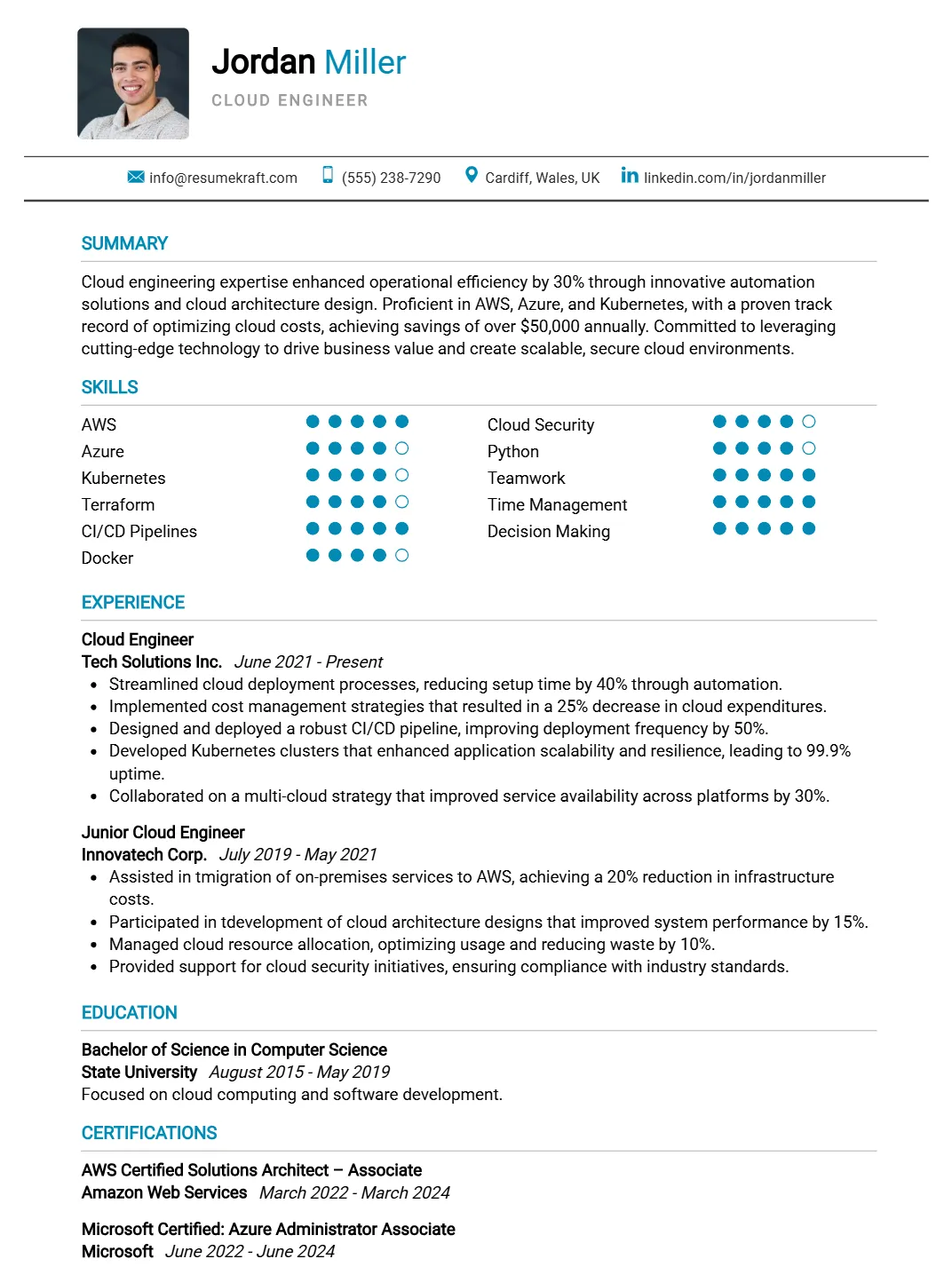
Why This Resume Works
This resume effectively positions the candidate for a Cloud Engineer role by prominently showcasing key skills such as AWS, Azure, Kubernetes, and Terraform, which are essential for the job. The structured format facilitates easy navigation, highlighting relevant experience gained over six years in progressively responsible roles. Additionally, it employs industry-specific keywords to ensure ATS compatibility. Strategic presentation of achievements related to CI/CD pipelines demonstrates the candidate’s impact on project efficiency and cloud solutions, making them an attractive choice for potential employers.
Cloud Solutions Architect Resume

Why This Resume Works
This resume is effective for a Cloud Solutions Architect position due to its clear emphasis on key skills like AWS Architecture and Cloud Migration, directly aligning with job requirements. The structured format enhances readability, showcasing relevant experience as both a Cloud Solutions Architect and Engineer over eight years. It incorporates industry-specific keywords to ensure ATS compatibility, increasing visibility to recruiters. Additionally, the strategic presentation of achievements in cloud projects demonstrates impactful contributions, reinforcing the candidate’s qualifications for this specialized role.
Cloud DevOps Engineer Resume
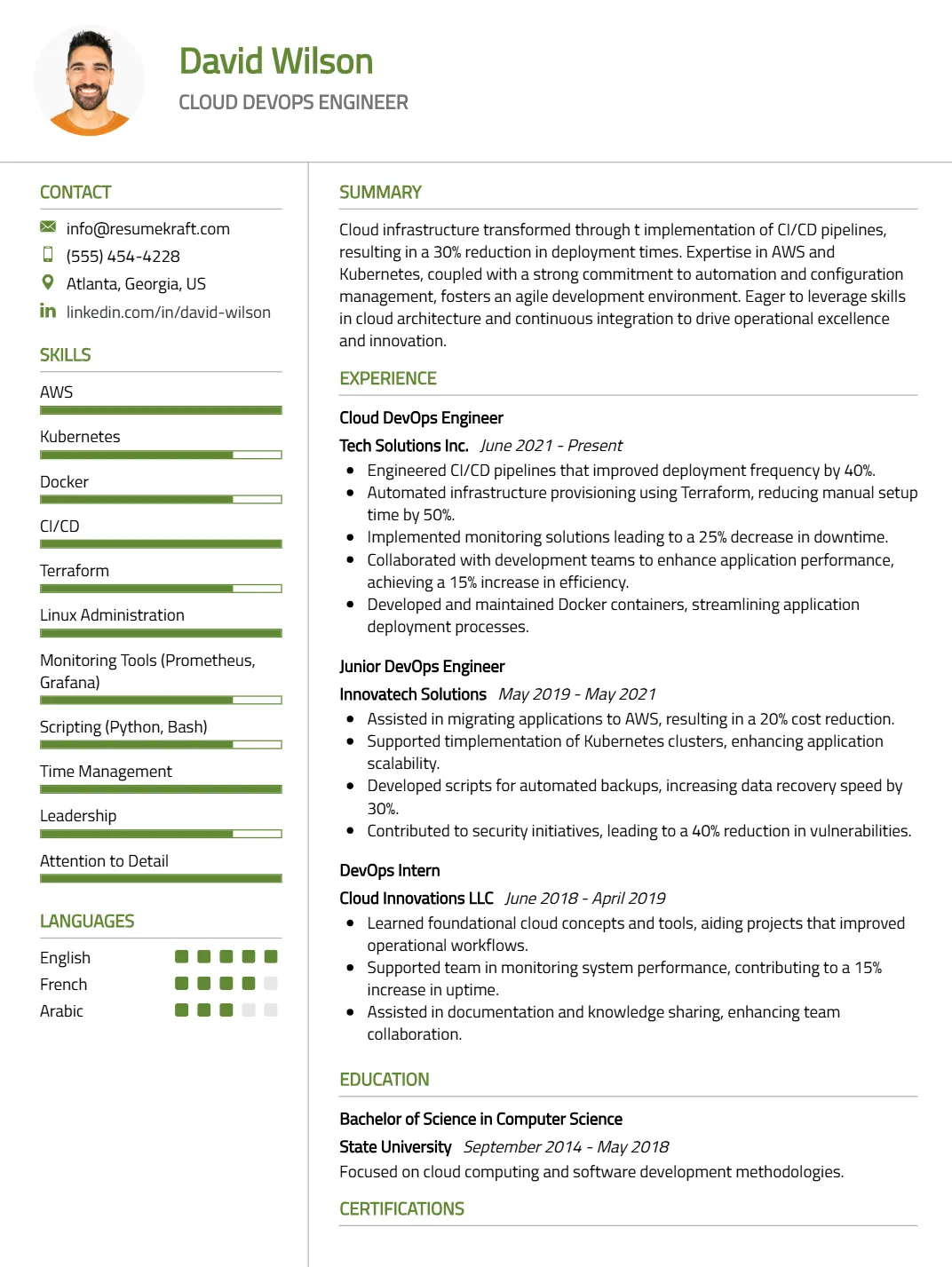
Why This Resume Works
This resume effectively showcases the candidate’s suitability for a Cloud DevOps Engineer position by highlighting essential skills such as AWS, Kubernetes, and CI/CD. With approximately seven years of progressive experience, it demonstrates a strong foundation in cloud technologies. The clean format enhances readability and allows hiring managers to quickly identify key qualifications. Additionally, the use of relevant keywords ensures ATS compatibility within the industry. Strategic presentation of achievements underscores their impact on projects, further aligning with the requirements of a Cloud DevOps role.
Cloud Infrastructure Engineer Resume
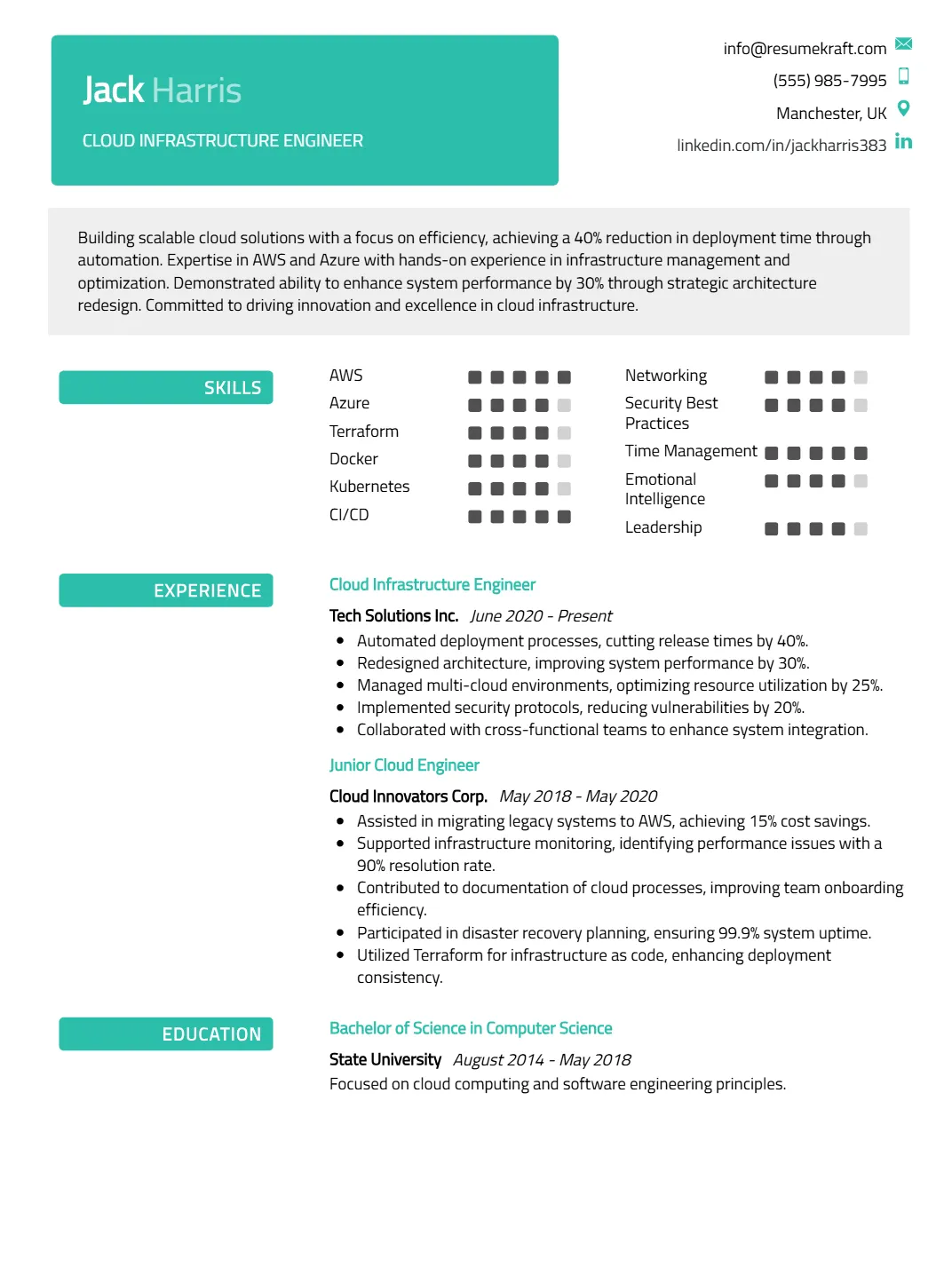
Why This Resume Works
This resume effectively highlights the candidate’s 7 years of relevant experience as a Cloud Infrastructure Engineer, showcasing key skills in AWS, Azure, Terraform, Docker, and Kubernetes that align with industry demands. Its clear format and structured layout facilitate quick comprehension by hiring managers, while also ensuring ATS compatibility through the strategic use of keywords. Furthermore, the resume emphasizes quantifiable achievements in cloud projects, demonstrating the candidate’s capability to deliver value in managing and optimizing cloud infrastructures essential for this role.
Cloud Security Engineer Resume
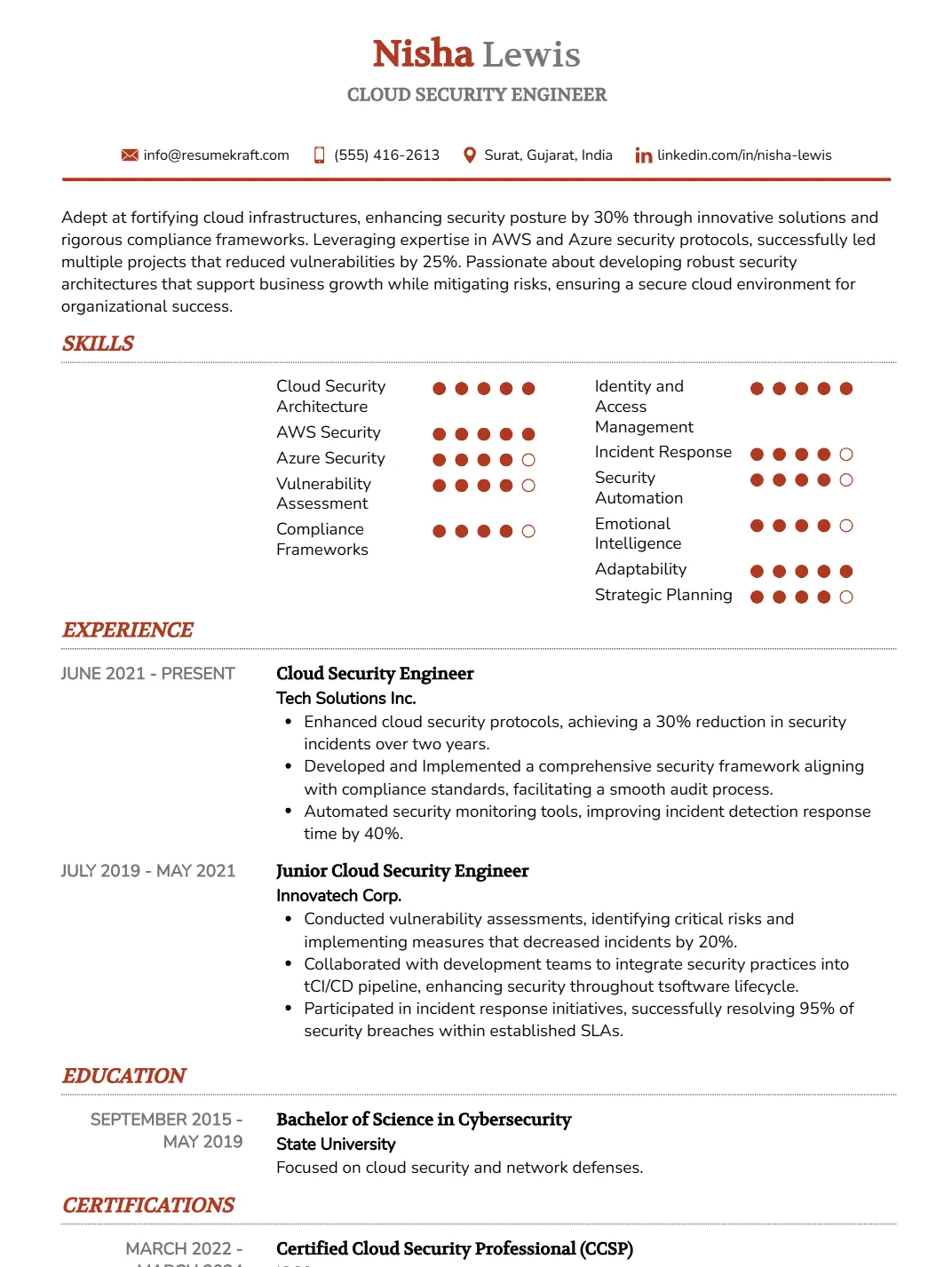
Why This Resume Works
This resume effectively targets the Cloud Security Engineer position by prominently featuring key skills such as Cloud Security Architecture and AWS/Azure Security, aligning perfectly with industry demands. Its clear format and structured layout enhance readability, making it easy for hiring managers to identify qualifications quickly. Additionally, the use of relevant keywords ensures ATS compatibility, increasing visibility during screening processes. Strategic presentation of achievements in vulnerability assessment and compliance frameworks demonstrates the candidate’s impact in previous roles, underscoring their suitability for this specialized field.
AWS Cloud Engineer Resume
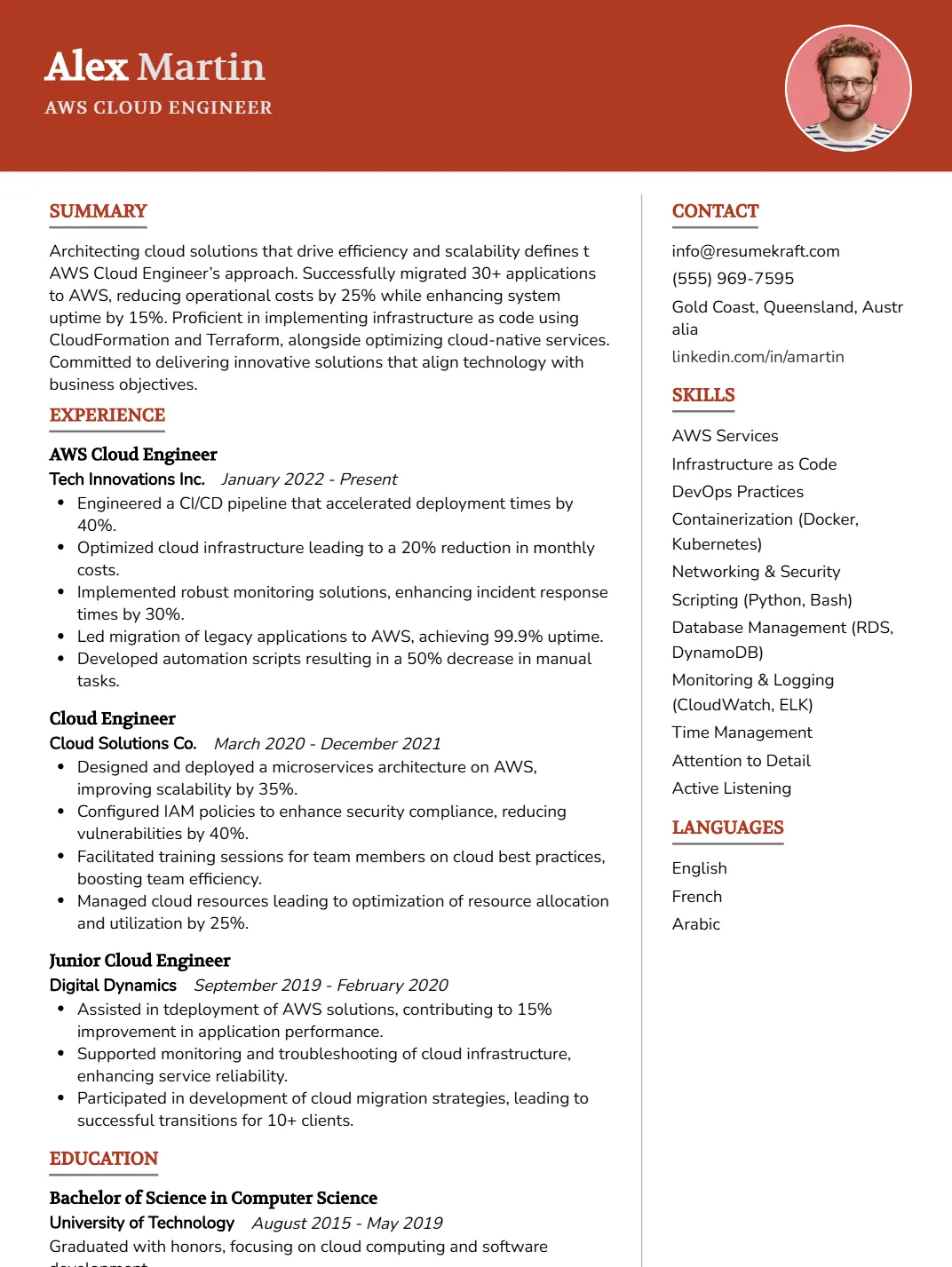
Why This Resume Works
This resume effectively showcases the candidate’s suitability for the AWS Cloud Engineer position by highlighting key skills such as AWS Services, Infrastructure as Code, and Containerization. With approximately five years of relevant experience across various roles, it demonstrates a progressive career trajectory in cloud engineering. The structured format enhances readability and ensures ATS compatibility, utilizing industry-specific keywords. Additionally, the strategic presentation of achievements underscores successful project implementations and operational efficiencies, making the candidate compelling to potential employers in the cloud computing field.
Azure Cloud Engineer Resume
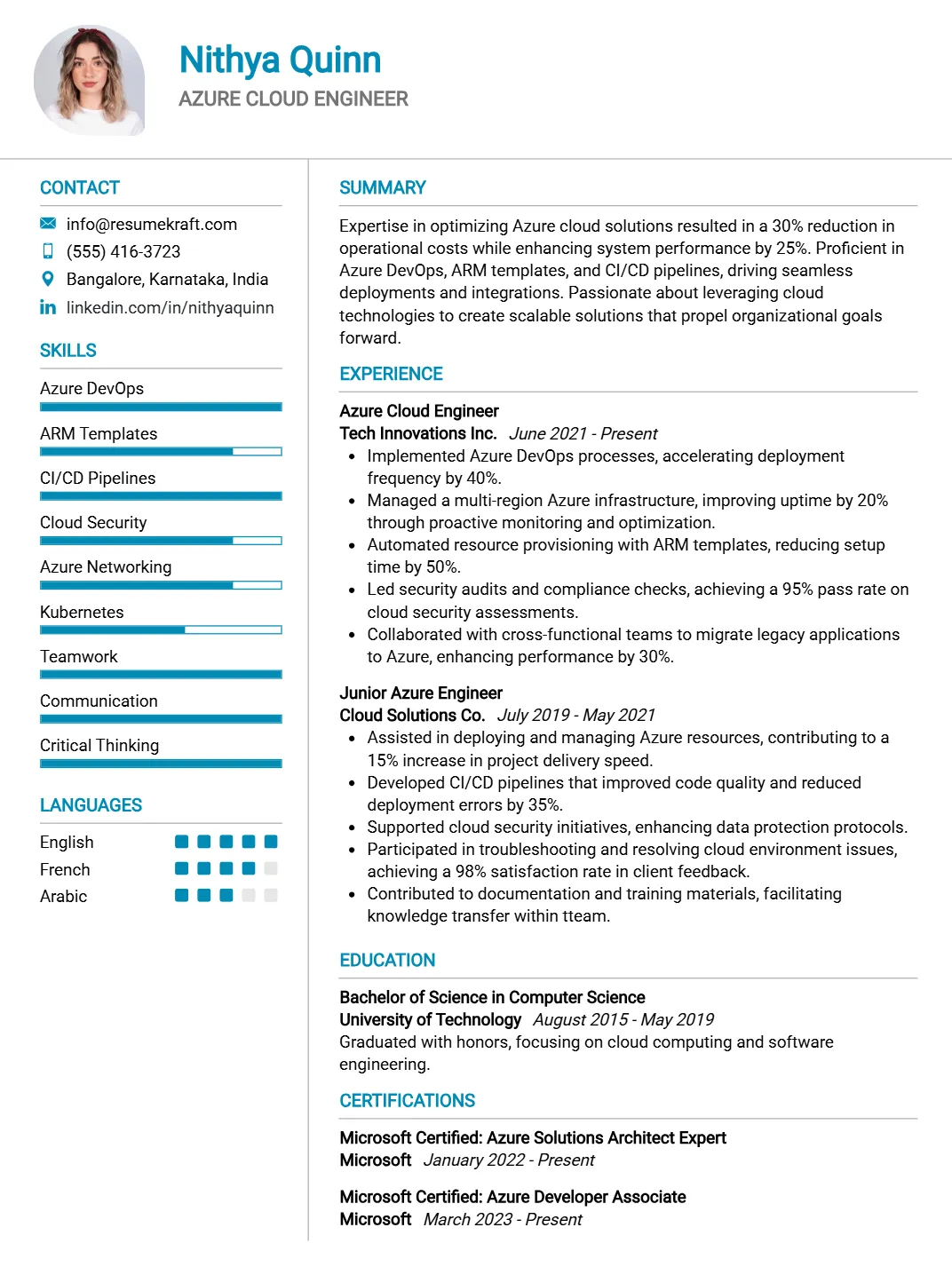
Why This Resume Works
This resume effectively positions the candidate for an Azure Cloud Engineer role by highlighting relevant key skills like Azure DevOps and CI/CD Pipelines, directly aligning with job requirements. Its clear format and structured layout enhance readability, allowing hiring managers to quickly assess qualifications. The use of industry-specific terminology ensures ATS compatibility, increasing visibility in automated screenings. Additionally, strategic presentation of achievements in cloud security and networking demonstrates practical experience, showcasing the candidate’s ability to deliver value in this specialized field.
Google Cloud Engineer Resume
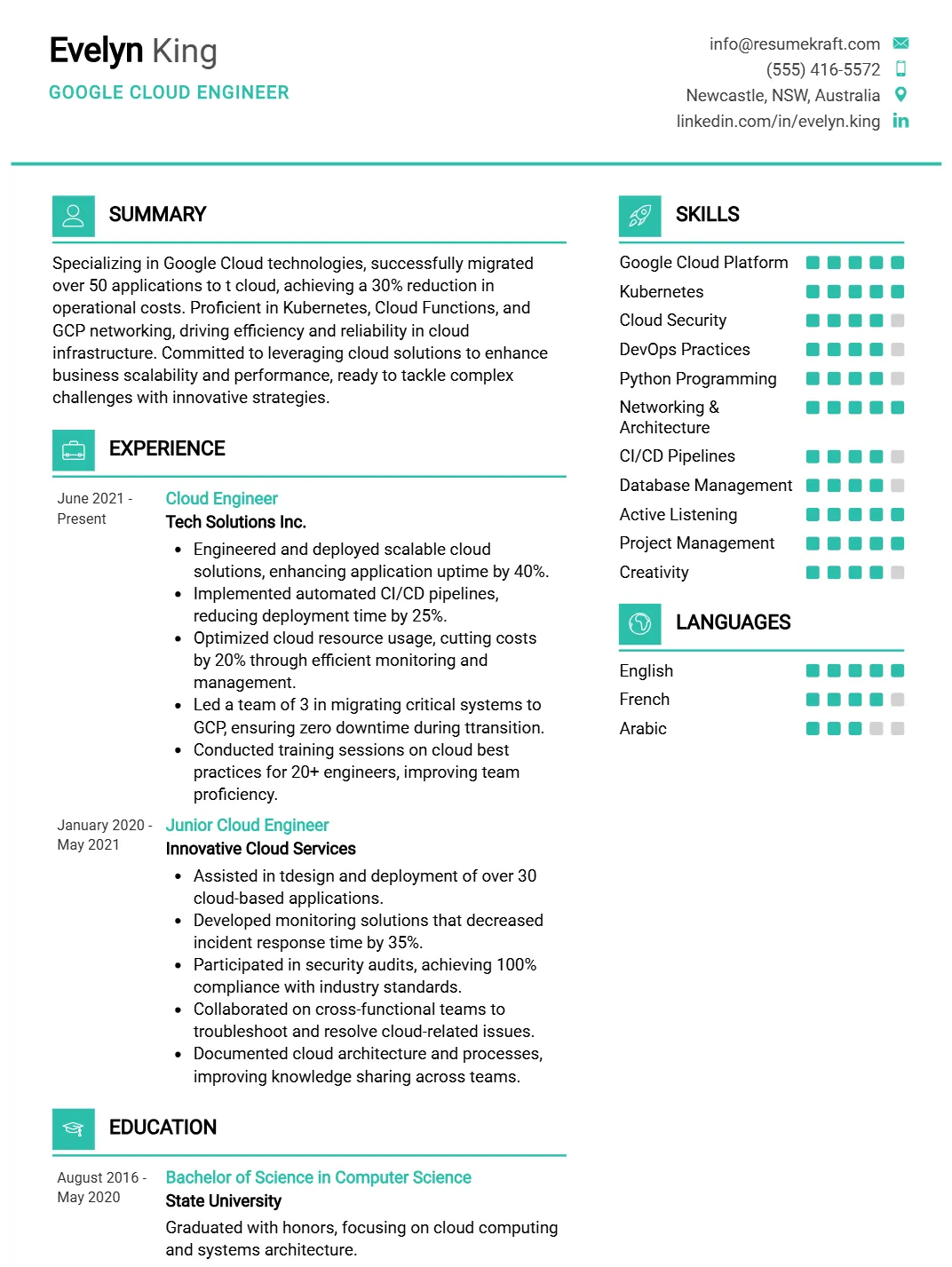
Why This Resume Works
This resume effectively showcases the candidate’s alignment with the Google Cloud Engineer position by highlighting essential skills such as Google Cloud Platform expertise and Kubernetes proficiency. With approximately five years of relevant experience, it illustrates a progressive career path in cloud engineering. The structured format ensures clarity and readability, enhancing ATS compatibility through keyword optimization related to cloud security and DevOps practices. Additionally, it strategically presents achievements that demonstrate tangible contributions to cloud projects, making it compelling for hiring managers in this field.
Cloud Systems Engineer Resume
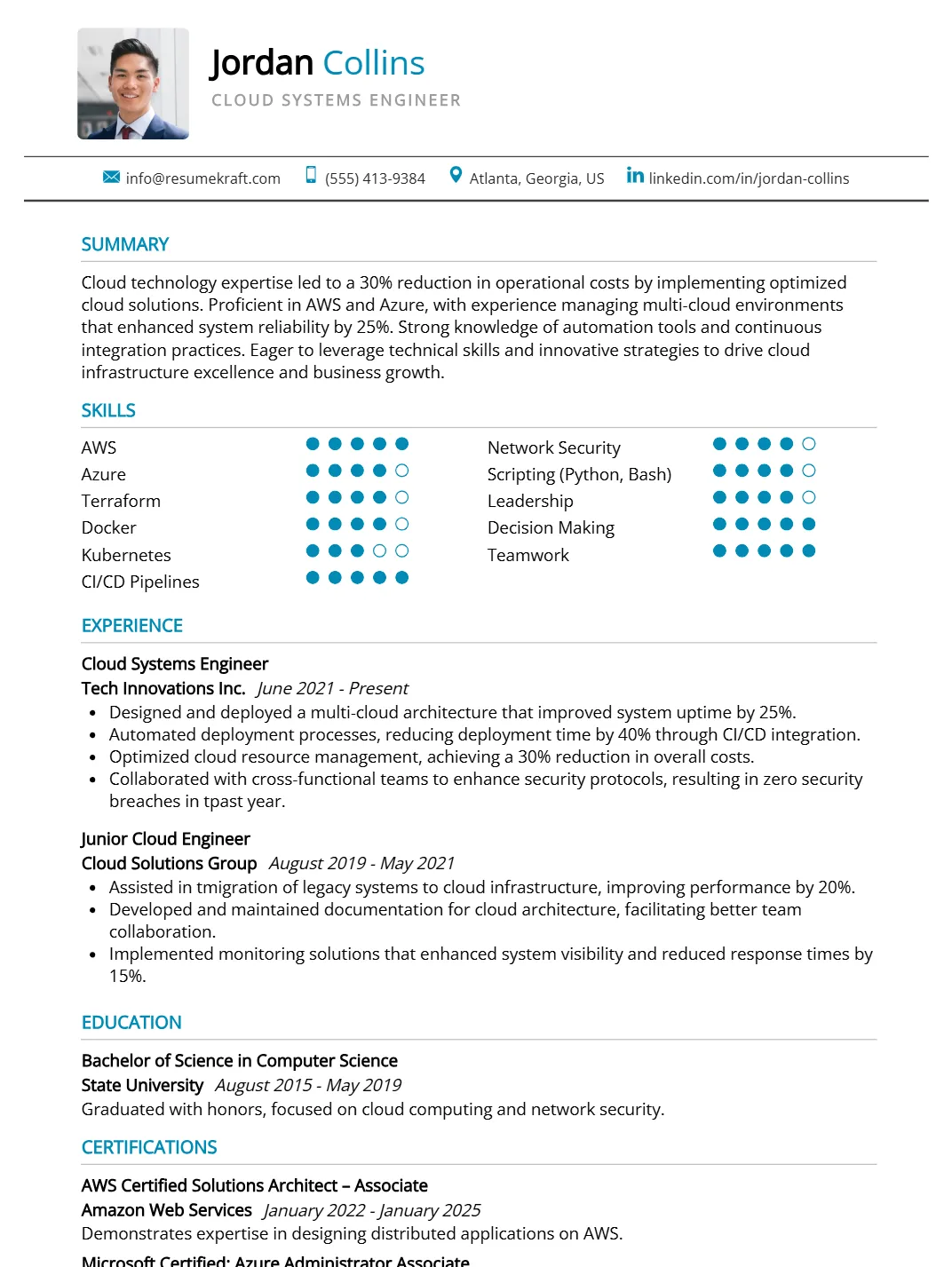
Why This Resume Works
This resume effectively showcases the candidate’s qualifications for a Cloud Systems Engineer position by highlighting key skills such as AWS, Azure, Terraform, Docker, and Kubernetes, which are essential in cloud infrastructure management. With approximately six years of relevant experience, the structured format emphasizes both technical proficiency and career progression. The use of industry-specific keywords enhances ATS compatibility, ensuring visibility to recruiters. Additionally, strategically presented achievements reflect impactful contributions in previous roles, underscoring the candidate’s ability to drive cloud innovation and efficiency.
Cloud Network Engineer Resume
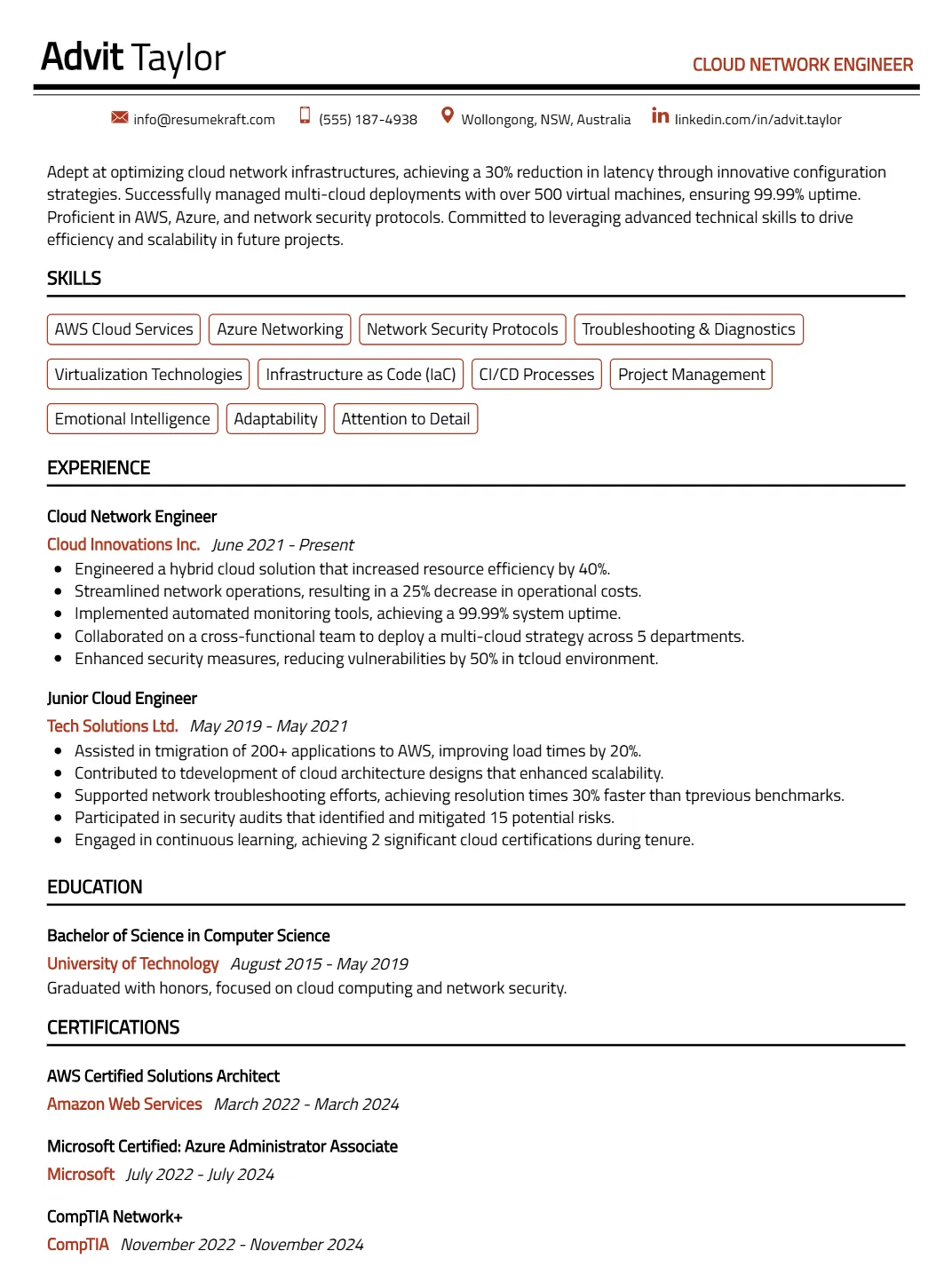
Why This Resume Works
This resume effectively positions the candidate for a Cloud Network Engineer role by prominently showcasing key skills like AWS Cloud Services and Azure Networking, which are crucial for the job. With approximately six years of relevant experience, it demonstrates a solid career progression from Junior Cloud Engineer to a more advanced role. The clear format enhances readability and highlights achievements relevant to network security and troubleshooting, ensuring ATS compatibility. Overall, this strategic presentation aligns well with industry expectations, making it an impactful application.
Cloud Automation Engineer Resume
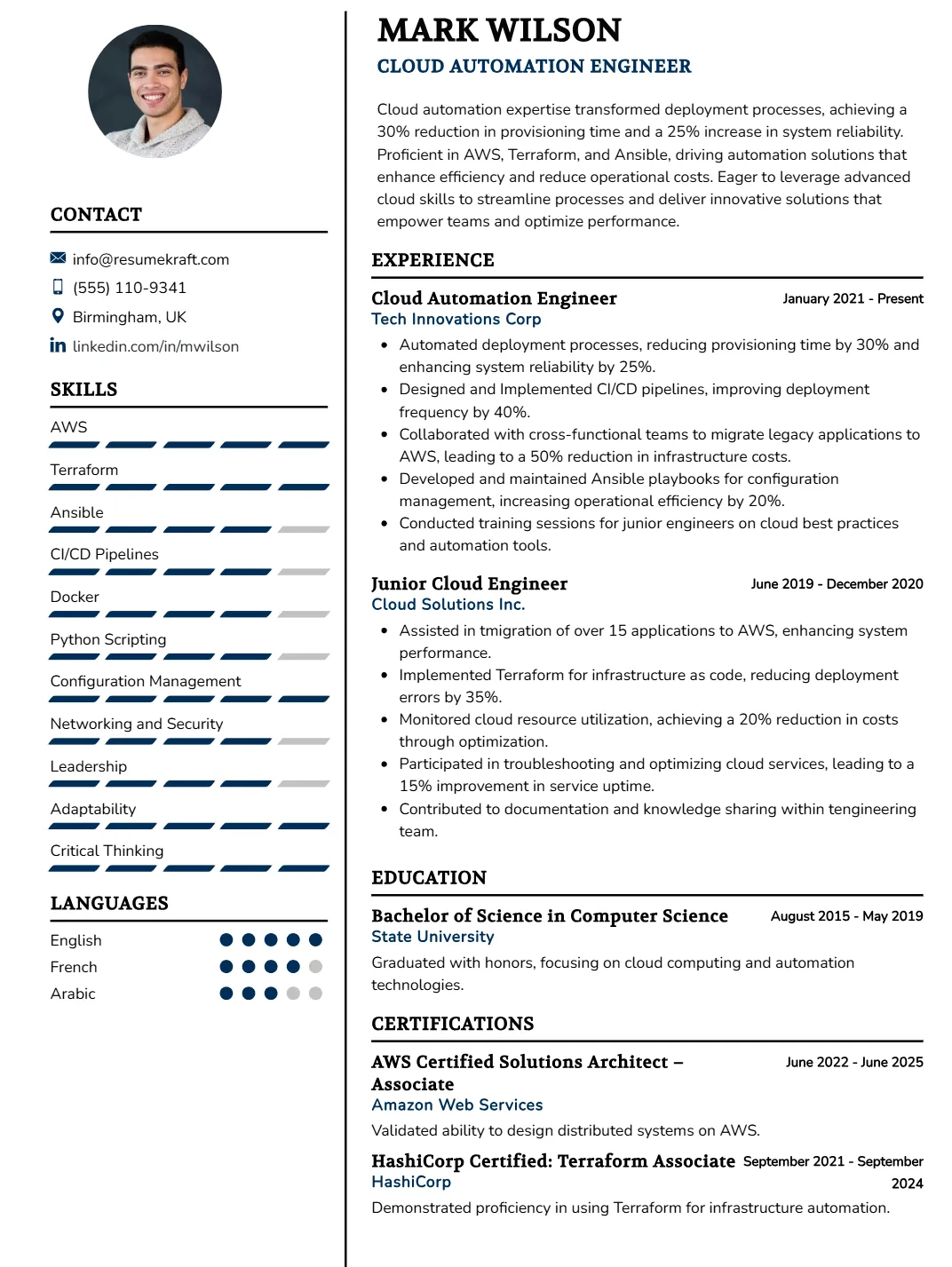
Why This Resume Works
This resume effectively highlights the candidate’s relevant skills, such as AWS, Terraform, and CI/CD Pipelines, aligning perfectly with the Cloud Automation Engineer role. The structured format clearly delineates experience gained over approximately five years, showcasing a progression from Junior Cloud Engineer to a specialized position. Its ATS-friendly design utilizes keywords pertinent to cloud automation, ensuring visibility in automated screenings. Additionally, strategic presentation of achievements demonstrates tangible impact in previous roles, reinforcing the candidate’s qualifications for optimizing cloud infrastructure and automation processes.
Cloud Platform Engineer Resume
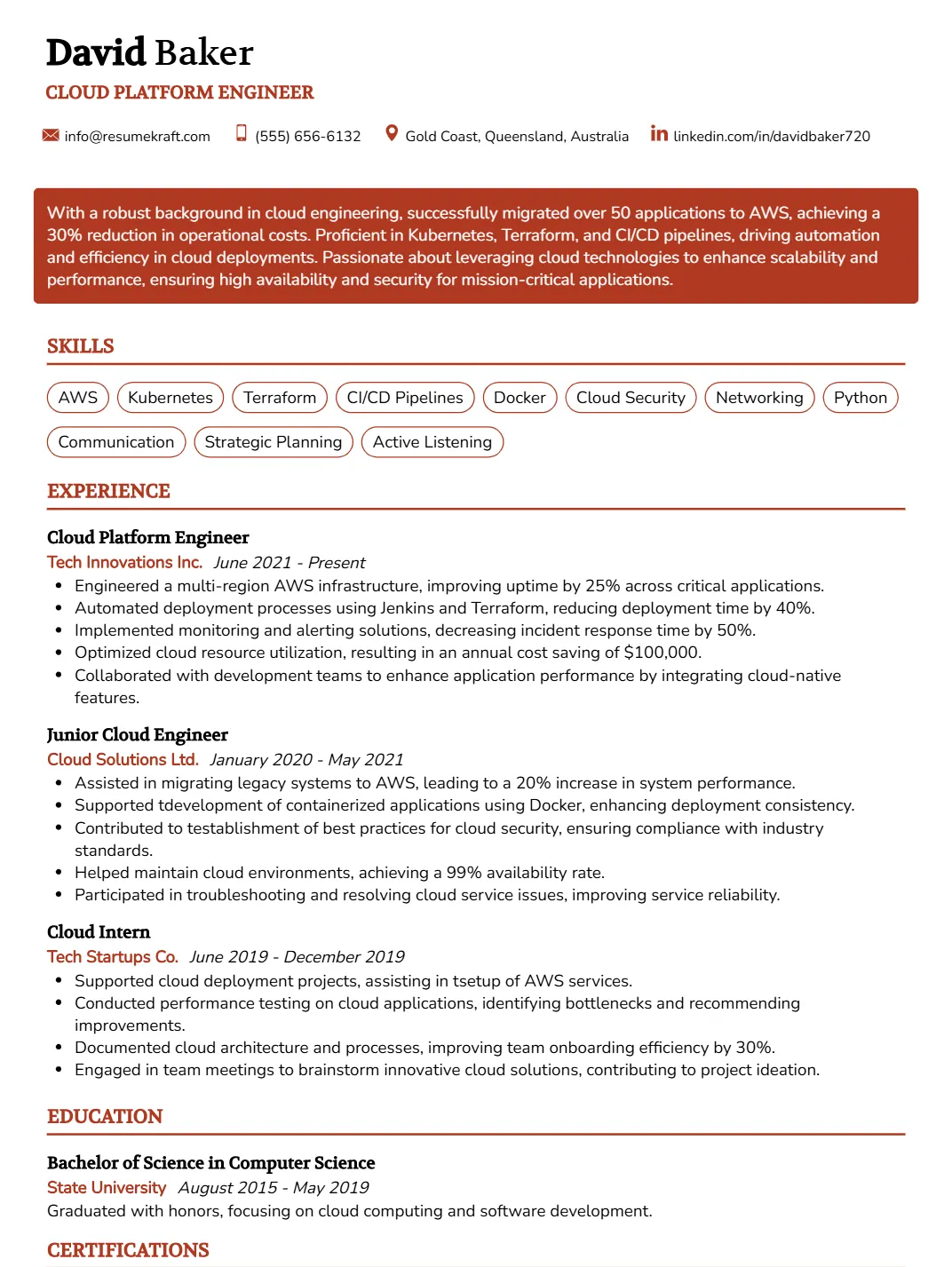
Why This Resume Works
This resume effectively highlights the candidate’s relevant skills, including AWS, Kubernetes, and Terraform, which are critical for a Cloud Platform Engineer role. With approximately five years of progressive experience in cloud engineering, it showcases a strong foundation in both development and operations. The clear format emphasizes key competencies and achievements, enhancing readability for hiring managers. Additionally, the use of industry-specific keywords ensures ATS compatibility, while strategic presentation of accomplishments demonstrates the candidate’s impact in previous roles, making them a standout applicant.
Cloud Operations Engineer Resume
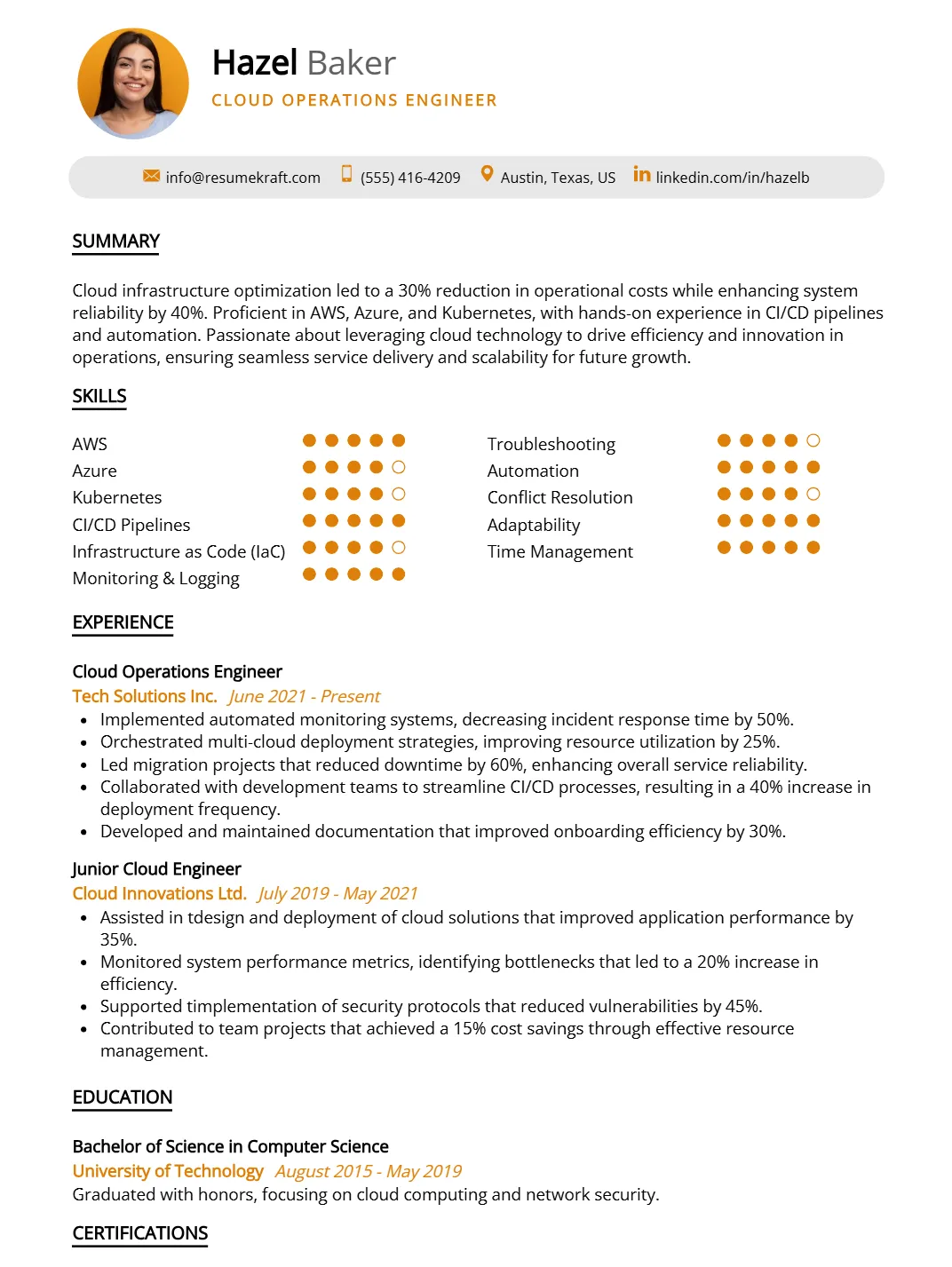
Why This Resume Works
This resume effectively positions the candidate for a Cloud Operations Engineer role by highlighting relevant skills in AWS, Azure, and Kubernetes, which are critical for cloud environments. The structured format emphasizes both professional experience and technical competencies, enhancing readability for hiring managers. Its clear organization aids ATS compatibility by incorporating industry-specific keywords. Additionally, strategic presentation of achievements related to CI/CD Pipelines and Infrastructure as Code showcases the candidate’s practical impact, making them a compelling choice for employers seeking expertise in cloud operations.
This resume effectively highlights the candidate’s relevant skills in Kubernetes, Docker, AWS, and microservices, aligning perfectly with the Cloud Native Engineer position. With six years of experience as a Cloud Native Engineer and Junior Cloud Engineer, it demonstrates a solid career progression. The structured format enhances readability and emphasizes key achievements, making it easy for hiring managers to assess qualifications quickly. Additionally, the inclusion of industry-specific keywords ensures ATS compatibility, increasing the likelihood of passing initial screenings and capturing employer interest.
Cloud Software Engineer Resume
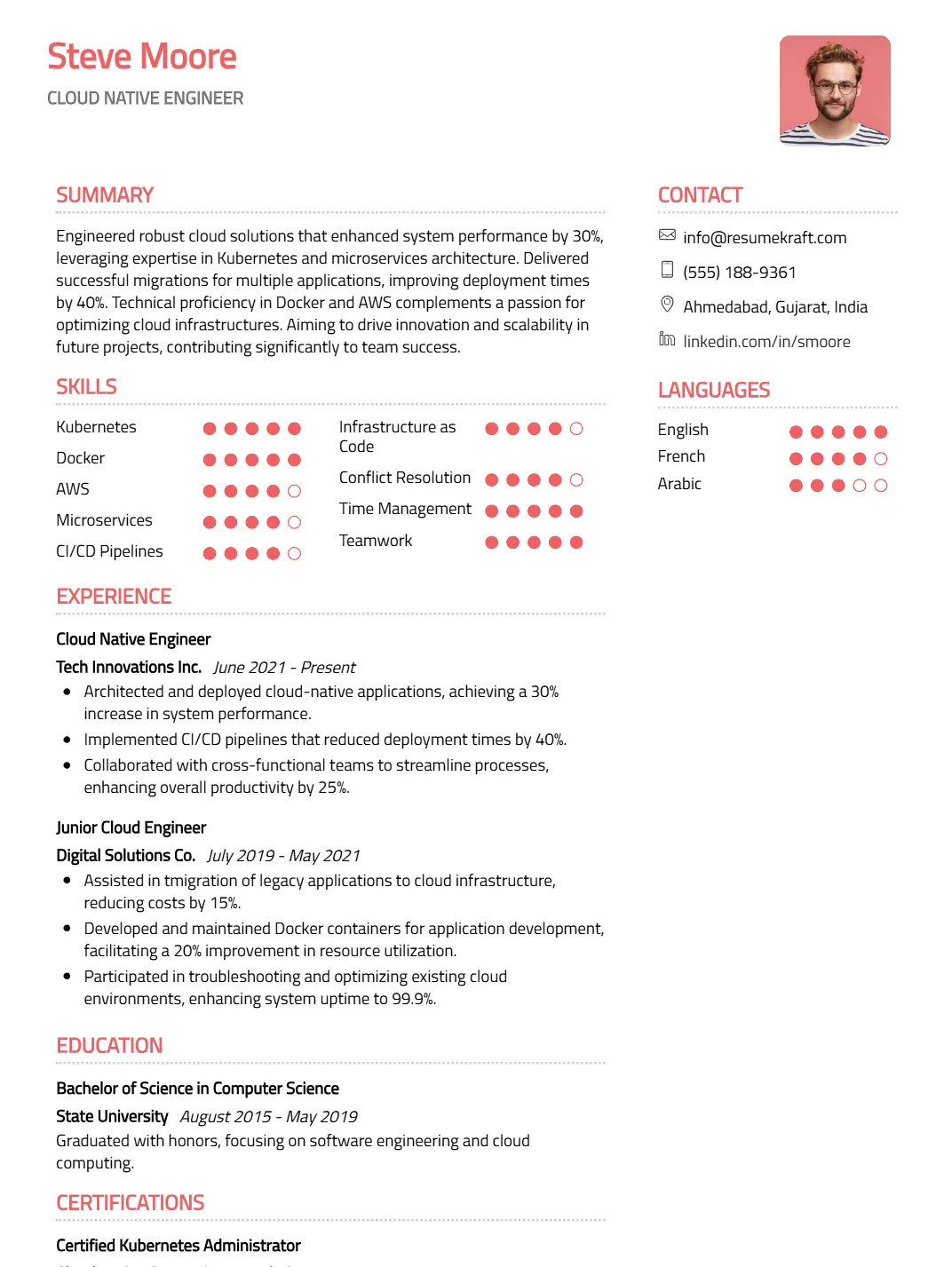
Why This Resume Works
This resume effectively highlights the candidate’s relevant skills in Kubernetes, Docker, AWS, and microservices, aligning perfectly with the Cloud Native Engineer position. With six years of experience as a Cloud Native Engineer and Junior Cloud Engineer, it demonstrates a solid career progression. The structured format enhances readability and emphasizes key achievements, making it easy for hiring managers to assess qualifications quickly. Additionally, the inclusion of industry-specific keywords ensures ATS compatibility, increasing the likelihood of passing initial screenings and capturing employer interest.
Multi-Cloud Engineer Resume
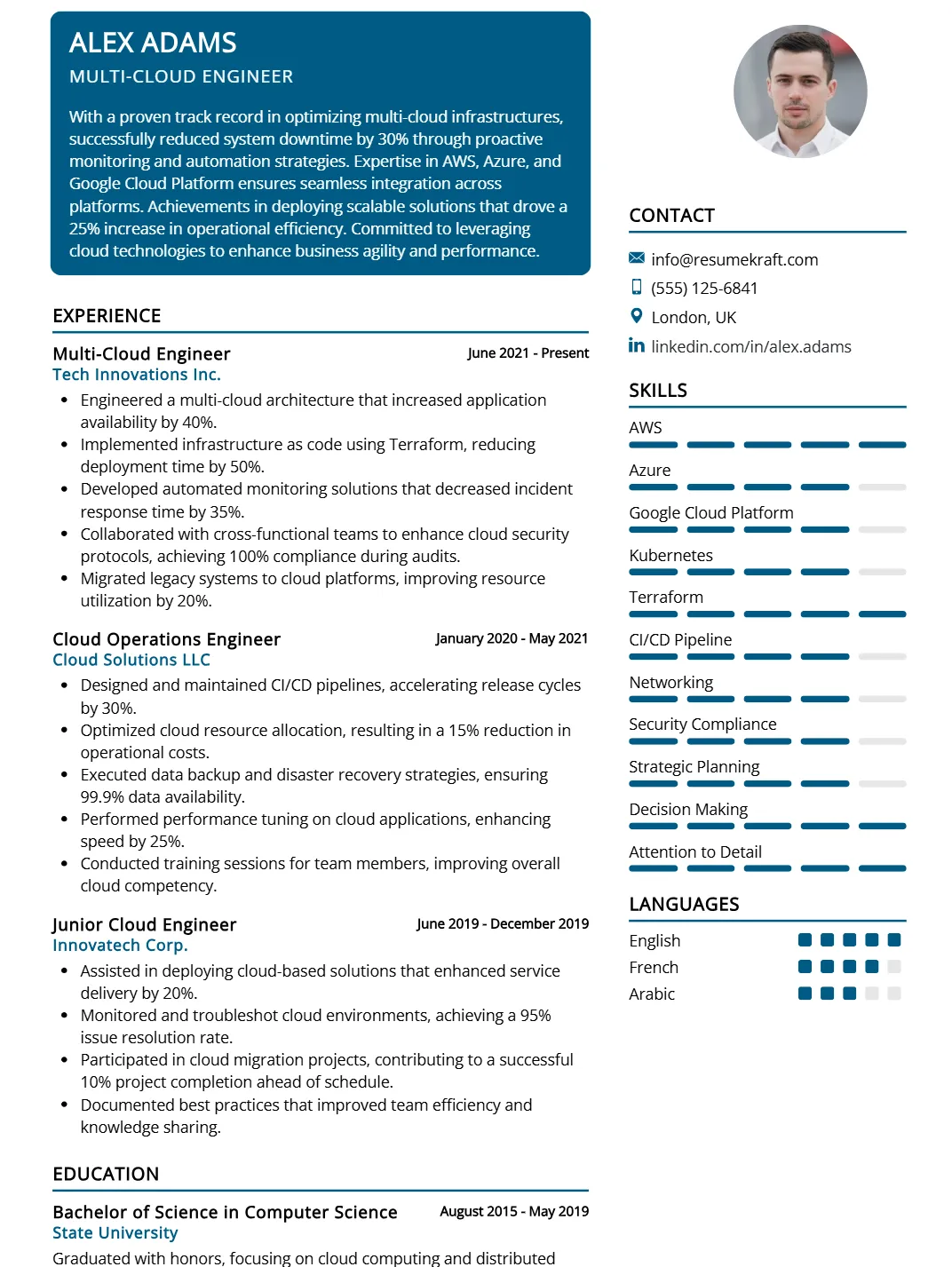
Why This Resume Works
This resume effectively highlights relevant skills such as AWS, Azure, Google Cloud Platform, Kubernetes, and Terraform, aligning perfectly with the requirements for a Multi-Cloud Engineer. The structured format enhances readability, making it easy for hiring managers to identify key qualifications and experience accumulated over five years. By incorporating industry-specific keywords, the resume ensures compatibility with Applicant Tracking Systems (ATS). Additionally, the strategic presentation of achievements demonstrates tangible contributions to cloud projects, showcasing the candidate’s capability to excel in multi-cloud environments.
Cloud Migration Engineer Resume
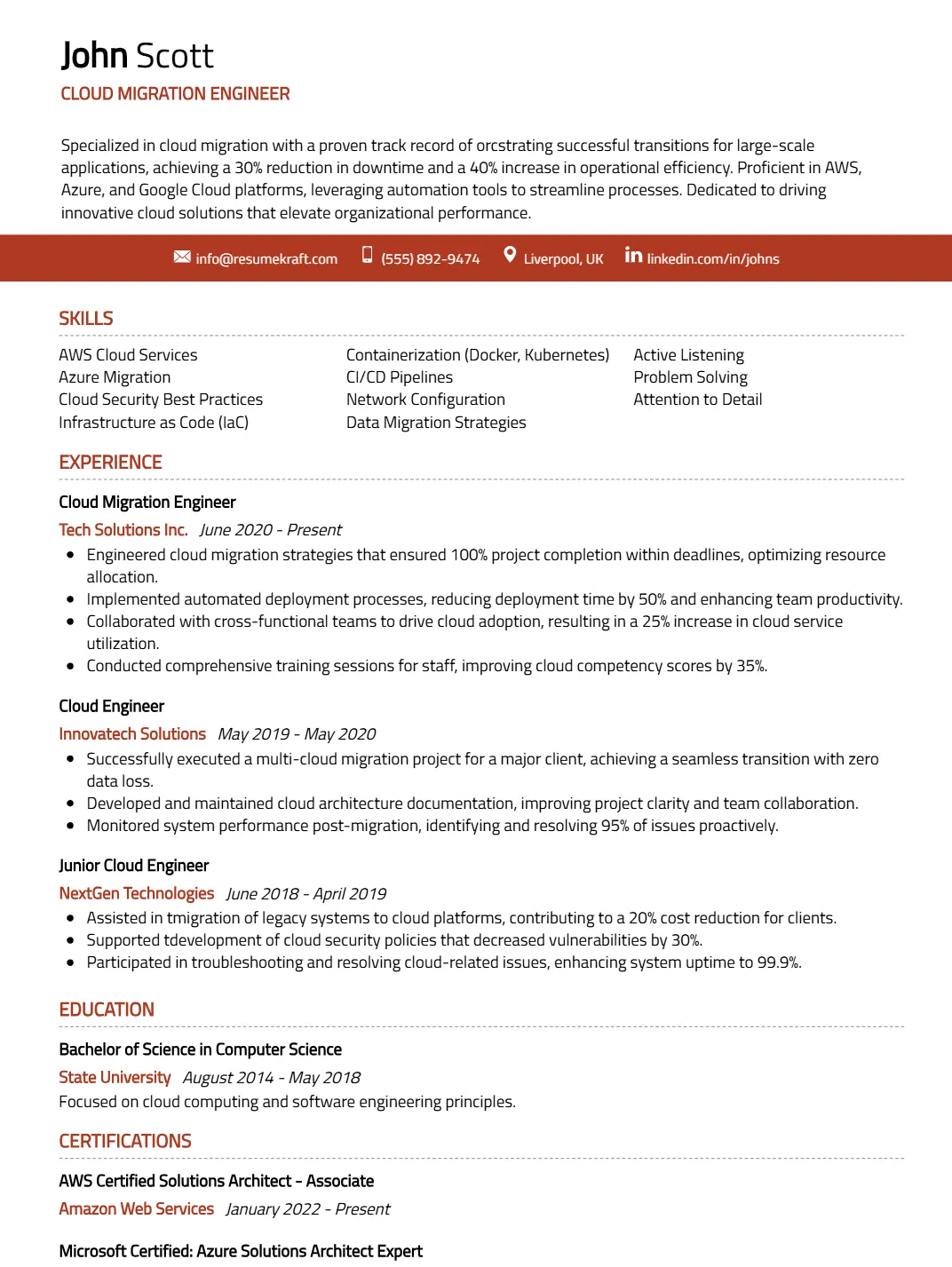
Why This Resume Works
This resume effectively positions the candidate for a Cloud Migration Engineer role by showcasing relevant skills like AWS Cloud Services and Azure Migration, which are crucial for cloud transitions. With approximately seven years of progressive experience in cloud engineering, it highlights a strong foundation in infrastructure as code and containerization. The structured format enhances readability, ensuring ATS compatibility by using industry-specific keywords. Additionally, strategically presented achievements underscore the candidate’s impact on successful migrations and security practices, making them a compelling choice for potential employers.
How to format a Cloud Computing Engineer resume template
Proper formatting is crucial for a Cloud Computing Engineer resume, as it enhances readability and allows recruiters to quickly identify key information. A well-structured resume format highlights your technical skills, certifications, and relevant experience, making a strong first impression.
- Use a clean, professional layout with clear headings to separate sections such as Experience, Skills, and Certifications, ensuring easy navigation for recruiters reviewing your Cloud Computing Engineer qualifications.
- Choose a readable font such as Arial or Calibri, sized between 10-12 points, to maintain clarity and professionalism throughout your resume, making your technical expertise stand out effectively.
- Prioritize relevant experience by listing your most recent roles first, emphasizing cloud-related projects and achievements to demonstrate your expertise in cloud technologies and solutions.
- Incorporate bullet points for your job responsibilities and accomplishments, making it easier for recruiters to scan your resume and quickly grasp your impact in previous Cloud Computing Engineer positions.
- Include specific metrics and outcomes in your achievements, such as reduced costs or improved performance, to illustrate your contributions to cloud initiatives and enhance the persuasive power of your resume.
How to write your Cloud Computing Engineer resume experience
Effectively presenting your work experience on a Cloud Computing Engineer resume is crucial as it showcases your technical skills, project management abilities, and problem-solving capabilities. Employers are looking for specific examples of how you’ve applied your expertise in cloud technologies, as well as your contributions to previous teams and projects. Highlighting relevant experience can set you apart from other candidates and demonstrate your value to potential employers.
Worked on various cloud projects and helped the team with cloud services.
Designed and implemented a multi-cloud architecture for a financial services client, reducing costs by 20% while improving system reliability and performance.
How to list your hard skills and soft skills on your resume
In the competitive field of cloud computing, both hard and soft skills play a crucial role in a Cloud Computing Engineer’s resume. Hard skills demonstrate the technical proficiency required to design, implement, and manage cloud services, while soft skills highlight the engineer’s ability to work collaboratively within teams, communicate effectively, and adapt to changing environments. A well-rounded resume that showcases both types of skills can significantly enhance an applicant’s chances of standing out to potential employers.
Hard Skills:
- Cloud Architecture: Understanding of designing cloud solutions and infrastructure.
- Virtualization: Proficient in using virtualization technologies such as VMware and Hyper-V.
- Network Configuration: Knowledge of configuring and managing network systems within cloud environments.
- Cloud Security: Expertise in implementing security measures to protect cloud data and applications.
- API Management: Skills in developing and managing APIs for cloud services.
- Scripting: Ability to write scripts in languages like Python or Bash to automate processes.
- Containerization: Familiarity with Docker and Kubernetes for deploying applications.
- Database Management: Experience in managing cloud databases, such as AWS RDS or Azure SQL.
- DevOps Practices: Understanding of CI/CD pipelines and tools for cloud deployment.
- Backup and Recovery: Knowledge of strategies for data backup and disaster recovery in the cloud.
- Monitoring Tools: Proficient in using tools like CloudWatch and Azure Monitor for performance tracking.
- Cloud Provider Platforms: Experience with major platforms like AWS, Google Cloud, or Azure.
- Cost Management: Skills in optimizing cloud resources to manage costs effectively.
- Compliance Standards: Familiarity with industry compliance regulations such as GDPR or HIPAA.
- Multi-Cloud Strategies: Understanding of managing and integrating services across different cloud platforms.
Soft Skills:
- Problem-Solving: Ability to analyze and resolve complex technical issues efficiently.
- Communication: Strong verbal and written skills for conveying technical concepts clearly.
- Team Collaboration: Experience working effectively in cross-functional teams.
- Adaptability: Flexibility to quickly adjust to new technologies and evolving cloud paradigms.
- Time Management: Skills in prioritizing tasks and managing multiple projects simultaneously.
- Attention to Detail: Thoroughness in ensuring all aspects of cloud deployment are accurate.
- Critical Thinking: Ability to assess situations and make informed decisions under pressure.
- Leadership: Experience in leading projects or mentoring junior engineers.
- Customer Focus: Commitment to understanding and meeting the needs of clients and stakeholders.
- Creativity: Innovative thinking to develop unique solutions for cloud challenges.
- Negotiation Skills: Ability to negotiate requirements and solutions with various stakeholders.
- Conflict Resolution: Skills in managing conflicts and fostering a positive work environment.
- Empathy: Understanding team dynamics and showing consideration for colleagues’ perspectives.
- Continuous Learning: Commitment to staying updated with the latest cloud technologies and trends.
- Networking: Ability to build and maintain relationships within the tech community.
- Project Management: Skills in organizing and overseeing project phases to ensure successful delivery.
How to list your certifications and education on your resume
When presenting certifications and education on a Cloud Computing Engineer resume, it’s essential to highlight relevant qualifications that demonstrate your expertise. Focus on degrees in computer science, information technology, or cloud computing, along with industry-recognized certifications such as AWS Certified Solutions Architect, Microsoft Certified: Azure Solutions Architect Expert, or Google Cloud Professional Cloud Architect. These credentials showcase your commitment to the field and enhance your credibility.
List your educational background and certifications in reverse chronological order, ensuring that the most recent and relevant qualifications are easily accessible. Include the institution name, degree or certification title, and the date of completion. This structured approach helps hiring managers quickly assess your qualifications and suitability for the role.
Graduated from university and took some online courses related to cloud computing.
Bachelor of Science in Computer Science, XYZ University, May 2022. AWS Certified Solutions Architect, obtained July 2023.
How to write your Cloud Computing Engineer resume summary or objective
A strong resume summary or objective is crucial for a Cloud Computing Engineer as it serves as a brief introduction to your qualifications and career goals. A summary is ideal for experienced professionals who want to highlight their accomplishments and skills, while an objective is suitable for entry-level candidates focusing on their career aspirations and the value they bring to potential employers.
The right summary or objective can capture the attention of hiring managers, leading them to read further into your resume. It succinctly conveys your expertise in cloud technologies, problem-solving abilities, and commitment to delivering efficient cloud solutions, ultimately setting the tone for the rest of your application.
Seeking a job in cloud computing where I can use my skills and learn more.
Detail-oriented Cloud Computing Engineer with 5 years of experience in designing scalable cloud architecture, aiming to leverage expertise in AWS and Azure to enhance organizational efficiency and drive innovation.
Additional sections for a Cloud Computing Engineer resume
Including additional sections in your Cloud Computing Engineer resume can significantly enhance its effectiveness by showcasing your unique qualifications and relevant experiences. These sections provide a more comprehensive view of your skills and contributions to potential employers.
- Certifications: Highlighting relevant cloud certifications, such as AWS Certified Solutions Architect or Google Cloud Professional, demonstrates your technical expertise and commitment to the field, making you a more attractive candidate.
- Projects: Detailing specific cloud projects you’ve worked on allows you to illustrate your hands-on experience and problem-solving skills, showcasing your ability to implement cloud solutions effectively.
- Publications: If you have authored articles or white papers related to cloud computing, including them can position you as a thought leader in the industry, reflecting your deep understanding of current technologies and trends.
- Volunteer Experience: Including any volunteer work related to cloud technologies highlights your passion for the field and willingness to contribute beyond paid roles, making you stand out as a dedicated professional.
- Technical Skills: A dedicated section for technical skills can help recruiters quickly identify your proficiency with specific tools and technologies, ensuring that you meet the technical requirements for the role.
Key takeaways for writing a professional Cloud Computing Engineer resume
- Highlight your proficiency in cloud platforms like AWS, Azure, or Google Cloud, emphasizing relevant certifications to demonstrate your technical expertise and commitment to the field.
- Use metrics to quantify your achievements, such as cost savings, improved performance, or project timelines, to make your contributions more impactful.
- Tailor your skills section to include both technical skills (like cloud architecture) and soft skills (like teamwork) to provide a well-rounded view of your capabilities.
- Utilize resume templates that suit your professional style; this can help present your information clearly and attractively, making it easier for recruiters to read.
- Consider using an ai resume builder to streamline the writing process, ensuring that your resume is optimized for applicant tracking systems and industry standards.
Frequently Asked Questions
How long should my Cloud Computing Engineer resume be?
Your resume should ideally be one page, especially if you have less than 10 years of experience in cloud computing. This length enables you to present your skills and accomplishments concisely, ensuring that hiring managers can quickly grasp your qualifications. If you have extensive experience or a significant number of certifications, you may extend it to two pages, but make sure every detail is relevant and enhances your candidacy for the position.
What is the best format for a Cloud Computing Engineer resume?
The best format for a Cloud Computing Engineer resume is the reverse-chronological format. This layout highlights your most recent experience and accomplishments first, making it easy for hiring managers to see your career progression. Use clear section headings and bullet points for readability. Additionally, ensure that you include relevant keywords from the job description to pass through Applicant Tracking Systems (ATS) effectively, showcasing your qualifications in alignment with the role.
What should I highlight on my Cloud Computing Engineer resume to stand out?
To stand out, emphasize your technical skills, such as proficiency in cloud platforms like AWS, Azure, or Google Cloud, along with relevant certifications (e.g., AWS Certified Solutions Architect). Highlight specific projects where you successfully implemented cloud solutions, focusing on your role and the impact of your work. Additionally, showcase your soft skills, such as teamwork and problem-solving abilities, as they are essential for collaboration in cloud environments and can set you apart from other candidates.
What are some ways to quantify my experience on my Cloud Computing Engineer resume?
Quantifying your experience is crucial for demonstrating your impact. Use specific metrics such as the percentage of cost savings achieved through cloud migration, the number of servers managed, or the reduction in downtime due to your implementations. For example, you might say, “Optimized cloud infrastructure, resulting in a 30% reduction in operational costs.” Also, mention the scale of projects, such as user growth or data volume handled, to provide context to your achievements and show your value effectively.

